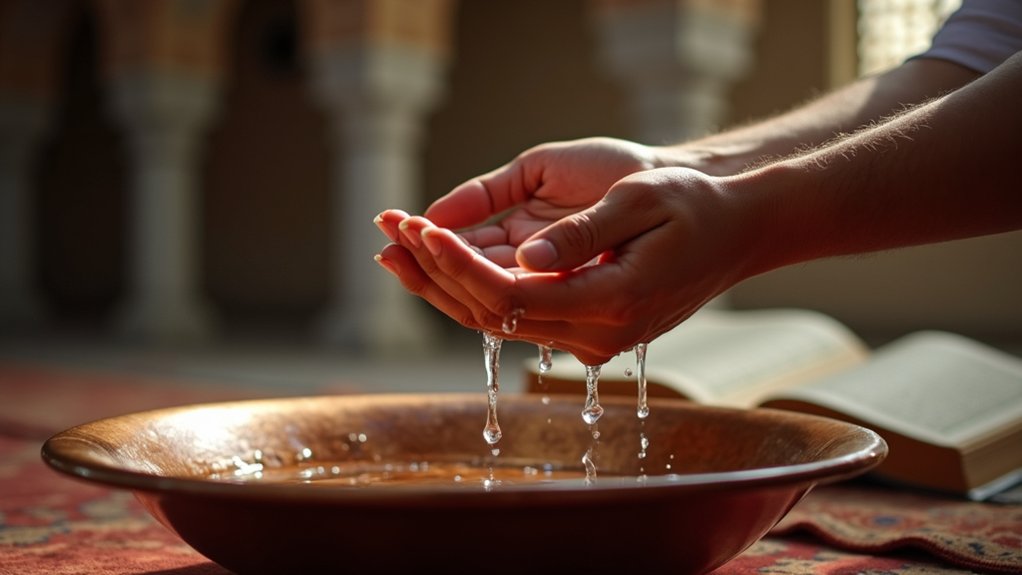
How did Byzantine culture and religion spread in Eastern Europe
Just how Byzantine culture and religion subtly transformed Eastern Europe reveals a fascinating blend of faith, politics, and innovation that shaped history.
Purification rituals in Islam play a central and transformative role in religion and spirituality, shaping both personal conduct and community life. From the daily act of Wudu before prayer to the full-body cleansing of Ghusl and the symbolic dry purification of Tayammum, these rituals go far beyond physical hygiene. They prepare the heart, calm the mind, and cultivate a state of humility before standing in worship. They also influence social interaction, ethical behavior, mosque etiquette, and even dietary habits.

When we explore the full purpose of purification rituals in Islam, we discover a rich spiritual framework focused on discipline, inner renewal, and unity among believers, values that reach into every corner of Muslim life.
The role of Wudu in daily prayers extends far deeper than a physical wash. Wudu is a spiritual reset performed multiple times a day, reminding Muslims to approach worship with clarity, sincerity, and inner stillness. Although often misunderstood as a simple ritual requirement, Wudu symbolizes the clearing of distractions and spiritual noise.
By washing the hands, mouth, nose, face, arms, head, and feet, the believer performs a symbolic release of worldly concerns. Each step of Wudu represents a mindful effort to align body, mind, and soul with the purpose of prayer.
In daily life, Wudu instills discipline, calling Muslims to pause, reflect, and refocus. The recurring act reinforces intentionality, helping turn prayer from a routine into a meaningful spiritual encounter. The role of Wudu in daily prayers therefore marks not just physical readiness, but a conscious transition from the material world to a sacred one.
The symbolism of Ghusl adds another layer of depth to Islamic purification rituals. Ghusl, the full-body cleansing performed after specific events or before important religious observances, embodies the idea of complete spiritual renewal.
Water, in Islamic tradition, is a symbol of life, mercy, and purification. In the symbolism of Ghusl, water washes away not only physical impurities but also represents the inner cleansing needed for major acts of worship. It signals a fresh start—an opportunity to reenter religious life with purity of intention and emotional clarity.
Believers often perform Ghusl before Friday prayers, Eid prayers, or moments of personal rebirth, such as converting to Islam. In each of these situations, Ghusl highlights the transformative power of water and the connection between outer cleanliness and inner purity.
The impact of Tayammum in maintaining ritual purity shows Islam’s emphasis on accessibility, compassion, and practicality. When water is unavailable, unsafe, or harmful due to illness, Islam allows believers to perform Tayammum—purifying themselves by using clean earth or dust.
This form of dry purification carries profound symbolism. Earth, like water, is a natural element that connects humans to creation. By performing Tayammum, believers reaffirm that purification is ultimately a spiritual act rooted in intention, not merely a physical one.
The impact of Tayammum in maintaining ritual purity is often misunderstood; some see it as a “lesser” purification. Yet scholars across Islamic traditions highlight its legitimacy and importance. Tayammum prevents believers from missing prayer during hardship and shows that God prioritizes ease and devotion over rigid requirements.
Understanding purification and its effect on mosque etiquette is essential for appreciating how these rituals shape community worship. A mosque is a sacred space, and maintaining its cleanliness is an important expression of respect.
Arriving in a state of purification reinforces mindfulness, humility, and proper behavior within the mosque. It encourages believers to be aware of their actions, to act with kindness, and to uphold communal respect.
Purification also helps unify worshippers. Standing shoulder-to-shoulder in prayer carries deeper meaning when everyone shares the same spiritual preparation. This creates an atmosphere of equality, unity, and mutual honor, core values in Islamic worship.
From managing cleanliness in prayer areas to maintaining calm and respectful conduct, purification and its effect on mosque etiquette is a powerful reminder that worship is both a personal and communal experience.
The connection between purification and dietary laws forms another important link between spiritual discipline and daily life. Islamic dietary laws, such as eating halal, avoiding harmful substances, and following ethical guidelines, promote physical purity, moral awareness, and gratitude.
Purification rituals reinforce these same values. Just as Wudu and Ghusl prepare the body for prayer, halal dietary choices prepare the body to function with clarity and health. Both practices encourage self-control, intentional living, and mindfulness toward God’s blessings.
Together, purification and dietary laws create a lifestyle rooted in discipline and spiritual awareness. Every act of eating becomes an opportunity for gratitude. Every moment of purification becomes a reminder of one’s commitment to faith.
The influence of ritual purity on social interactions extends well beyond worship. Cleanliness, physical, ethical, and spiritual, is a foundational principle in Islamic life. Observing purification rituals fosters respectful interactions, empathy, and strong social bonds.
When individuals maintain ritual purity, they embody qualities such as:
The influence of ritual purity on social interactions also strengthens trust. Shared practices unite community members through common spiritual goals. Whether during prayer, gatherings, or daily routines, the emphasis on purity reminds individuals of their interconnectedness and accountability.
Purification practices during religious festivals amplify the communal and celebratory aspects of Islamic spirituality. Before attending Eid prayers, communal gatherings, or special ceremonies, many Muslims perform Wudu or Ghusl to enter the occasion with renewed intention and purity.
These purification practices during religious festivals create a sense of unity and shared excitement. They prepare worshippers emotionally and spiritually, helping align their gratitude, joy, and devotion with the blessings of the festival.
Through these rituals, moments like Eid al-Fitr and Eid al-Adha gain deeper meaning, not just as celebrations but as opportunities for collective purification, reflection, and renewal.
Purification rituals in Islam serve as powerful foundations for worship, spirituality, and community life. Practices such as Wudu, Ghusl, and Tayammum connect physical cleanliness with inner clarity, helping believers approach prayer with focus, humility, and sincerity. Beyond worship, these rituals shape respectful behavior in mosques, guide ethical dietary choices, and influence positive social interactions rooted in trust and unity.
Ultimately, purification rituals in Islam cultivate a spiritually conscious lifestyle, one where discipline, intention, and devotion flow through daily routines and religious observances. They remind believers that purity of body and purity of heart work together to strengthen faith, deepen worship, and bring the community closer to God.

Just how Byzantine culture and religion subtly transformed Eastern Europe reveals a fascinating blend of faith, politics, and innovation that shaped history.

What mysteries did Olmec and Mayan religions unlock about life, power, and the cosmos? Their beliefs shaped civilizations in ways still felt today.

Bridging the seen and unseen, African art reveals deeper spiritual meanings—discover how creativity becomes a sacred dialogue in these cultures.

Linking sacred numbers to celestial events, the Maya intertwined math and religion in ways that still mystify scholars today. Discover their profound connection.

The transformative impact of culture on Buddhist practices reveals unexpected variations that challenge traditional interpretations and invite deeper exploration.

Journey into how religion and mythology shaped every facet of Greek life, revealing secrets that still captivate and influence us today.